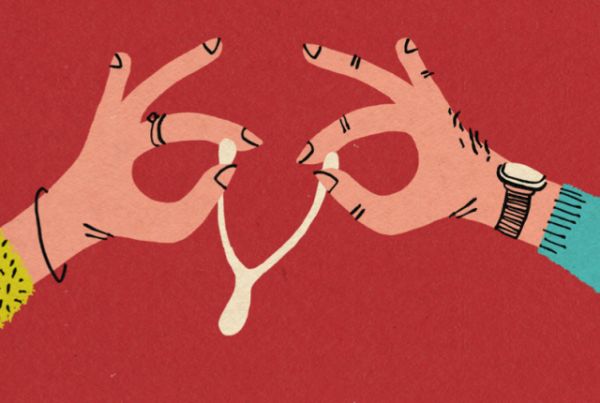
In
1938, a Detroit street sweeper named Joseph Figlock saved the life of a
baby falling from an apartment building. A lucky moment, indeed. It
was also an odd coincidence, because, according to
Time
magazine, the same man had performed the very same act just a year
prior. Even more astounding? It was reported to be the same baby.
Astonishing
tales like this make us laugh in disbelief. But behind the laughter
lurks fear: Humans have a deep psychological need for the universe to
feel controllable—or at least predictable. “People are much more
relaxed if they feel in command, whether they really are or not,” says
David Hand, a British statistician and author of
The Improbability Principle. “The notion that events might happen just by chance can be terrifying.”

As
a species, we persuade ourselves that we can influence random events, a
fantasy psychologists call “the illusion of control.” Casino gamblers
throw dice more gently when they want lower numbers, according to one
study. In another, 40 percent of subjects believed they could get
better outcomes from tossing a coin the more they practiced. It’s
little wonder, then, that people sit up and listen when self-help gurus
claim to offer techniques for learning to be luckier. The good news is
that, in some sense, you really can “make your own luck.”
For starters, forget about influencing the outcome of truly chance-based events, like coin tosses or lottery draws.
You should also avoid trying to make your own luck by focusing on the
outcomes you desire, as advised in New Age bestsellers like
The Secret.
Research by the psychologists Gabriele Oettingen and Doris Mayer
indicates that the more people positively fantasize about, say, getting a
great job, the less money they end up earning, perhaps because fantasy
replaces effort that could get them ahead in the real world.
Similarly, people who positively fantasize more about romance are less
likely to ask out potential partners on actual dates.
Such
findings draw attention to the fact that “luck” is an ambiguous term.
We use it to describe life’s sheer randomness—but also to explain those
opportunities we encounter because we’ve looked for them. Expose
yourself to new people and events and you’re far more likely to meet
your next employer—or the love of your life—than if you stay locked in
your home. The best approach, research suggests, isn’t a laser-like
focus on what you think you want. It’s to cultivate a radical openness
to unplanned experiences, loosen your grip on your goals, and embrace
uncertainty.
Several years ago, the ps

ychologist
Richard Wiseman recruited subjects who thought of themselves as either
unusually lucky or unlucky. The self-described lucky ones, he
discovered, shared a set of behavioral traits that maximized their good
fortune. They were receptive to new experiences and invested time in
expanding their social and professional networks; when things went
wrong, they reminded themselves that things could have gone worse. By
focusing less on their goals, they actually accomplished those goals
more efficiently. In one experiment, Wiseman asked participants to
count the number of photographs in a newspaper. The unlucky people
diligently plodded through. The lucky ones were far more likely to spot
one of two messages Wiseman had inserted on the page. The first read
“Stop counting—there are 43 photographs in this newspaper.” The other
offered a $250 reward if the reader just asked the experimenter for the
cash.
Wiseman concluded that being too goal-focused can actually
interfere with achieving goals, something that bears out when you look
at successful entrepreneurs. The popular stereotype of the innovator
who envisions a miraculous new product or service and then stubbornly
fights to make it real isn’t accurate, according to management scholar
Saras Sarasvathy. Rather, the most successful innovators are the ones
who are willing to use the people and resources at their disposal to
take action—even if they can’t see the endpoint.

Uncertainty
feels uncomfortable, so we’re tempted to do whatever we can to get rid
of it. But learning to tolerate it instead will bring you better luck.
Writer Karla Starr refers to this as “structured serendipity.” Don’t
abandon your daily schedule, she advises, but make sure it includes
chances for unexpected things to happen. Spend an hour wandering a
bookstore; invite a random acquaintance for coffee. On social media,
follow some people whose enthusiasms you don’t already share. Leave
extra time for errands, to permit spontaneous detours en route.
And
whether or not you improve your luck, you can take solace in the fact
that you’re certainly luckier than Maureen Wilcox. In 1980, she bought
tickets for the Massachusetts and Rhode Island lotteries and picked the
winning numbers for both. Unfortunately, her Massachusetts numbers
were the winning ones in Rhode Island and vice versa, so she won
nothing.
And yet, Hand points out, statistically speaking, Wilcox
was no less lucky than anyone else who didn’t win that week. The true
lesson of her story isn’t that some people have terrible luck; it’s
that almost everyone who plays the lottery loses. Spend those dollars
on a cup of coffee with a stranger instead.
 In
1938, a Detroit street sweeper named Joseph Figlock saved the life of a
baby falling from an apartment building. A lucky moment, indeed. It
was also an odd coincidence, because, according to Time
magazine, the same man had performed the very same act just a year
prior. Even more astounding? It was reported to be the same baby.
In
1938, a Detroit street sweeper named Joseph Figlock saved the life of a
baby falling from an apartment building. A lucky moment, indeed. It
was also an odd coincidence, because, according to Time
magazine, the same man had performed the very same act just a year
prior. Even more astounding? It was reported to be the same baby. As
a species, we persuade ourselves that we can influence random events, a
fantasy psychologists call “the illusion of control.” Casino gamblers
throw dice more gently when they want lower numbers, according to one
study. In another, 40 percent of subjects believed they could get
better outcomes from tossing a coin the more they practiced. It’s
little wonder, then, that people sit up and listen when self-help gurus
claim to offer techniques for learning to be luckier. The good news is
that, in some sense, you really can “make your own luck.”
As
a species, we persuade ourselves that we can influence random events, a
fantasy psychologists call “the illusion of control.” Casino gamblers
throw dice more gently when they want lower numbers, according to one
study. In another, 40 percent of subjects believed they could get
better outcomes from tossing a coin the more they practiced. It’s
little wonder, then, that people sit up and listen when self-help gurus
claim to offer techniques for learning to be luckier. The good news is
that, in some sense, you really can “make your own luck.”
No comments:
Post a Comment